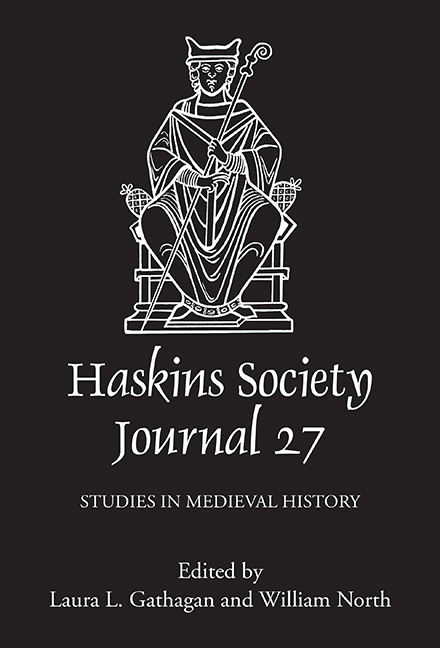Book contents
- Frontmatter
- Contents
- List of Figures
- Editors’ Note
- Abbreviations
- 1 Rural Settlement in Roman Britain and Its Significance for the Early Medieval Period
- 2 Holy Relics, Authority, and Legitimacy in Ottonian Germany and Anglo-Saxon England
- 3 Beyond the Obvious: Ælfric and the Authority of Bede
- 4 Byrhtferth’s Historia Regum and the Transformation of the Alfredian Past
- 5 Geoffrey le Bel of Anjou and Political Inheritance in the Anglo-Norman Realm
- 6 Observations on the Twelfth-century Historia of Alfred of Beverley
- 7 Helena, Constantine, and the Angevin Desire for Jerusalem
- 8 The Revolts of the Embriaco and the Fall of the County of Tripoli
- 9 Jewish Women, Christian Women, and Credit in Thirteenth-Century Catalonia
- 10 Military Entrepreneurs in the Armies of Edward I (1272–1307) of England
6 - Observations on the Twelfth-century Historia of Alfred of Beverley
Published online by Cambridge University Press: 07 May 2022
- Frontmatter
- Contents
- List of Figures
- Editors’ Note
- Abbreviations
- 1 Rural Settlement in Roman Britain and Its Significance for the Early Medieval Period
- 2 Holy Relics, Authority, and Legitimacy in Ottonian Germany and Anglo-Saxon England
- 3 Beyond the Obvious: Ælfric and the Authority of Bede
- 4 Byrhtferth’s Historia Regum and the Transformation of the Alfredian Past
- 5 Geoffrey le Bel of Anjou and Political Inheritance in the Anglo-Norman Realm
- 6 Observations on the Twelfth-century Historia of Alfred of Beverley
- 7 Helena, Constantine, and the Angevin Desire for Jerusalem
- 8 The Revolts of the Embriaco and the Fall of the County of Tripoli
- 9 Jewish Women, Christian Women, and Credit in Thirteenth-Century Catalonia
- 10 Military Entrepreneurs in the Armies of Edward I (1272–1307) of England
Summary
One of England's lesser known twelfth-century historical writers is Alfred, sacrist of the collegiate church of Beverley in the East Riding (ER) of Yorkshire, and author-compiler of a Latin prose narrative recounting the history of Britain from its supposed foundation by the Trojan Brutus to the time of Henry I. The work is arranged in nine capitula, ‘chapters’. The first five abbreviate Geoffrey of Monmouth's Historia Regum Britanniae ( HRB), incorporating the newly discovered British history within a narrative that draws also on the accounts of conventional historical authorities of the time: Bede's Historia Ecclesiastica, Paul the Deacon's Historia Romana, and Orosius’ Historiarum Adversus Paganos amongst others. Compiling his work only a decade or so after the appearance of Geoffrey's history (c. 1148 x c. 1151–1153, see below), Alfred is the first historical writer to attempt to integrate the HRB within a comprehensive history of Britain; Henry of Huntingdon's 1139 epitomization of that work in the form of the Epistola Warino Britoni (Letter to Warin the Breton) is inserted only as a stand-alone piece in book eight of the Historia Anglorum. Only one printed edition of Alfred's history exists. This was published in 1716 by the Oxford antiquary, Thomas Hearne, who attached to the work the title ‘Aluredi Beverlacensis Annalium’: thus ‘Alfred's Annals’ is how the compilation has, misleadingly, come to be known. The compilation is not written in annalistic form and its chapters each address an historical period with a given theme. In his prologue Alfred gives us his reasons for designing the work in this way:
… For in this work, described as if in a little notebook, the scholarly reader will be able to learn of events which can otherwise only be read about scattered here and there in the writings of several different authors, covering more than two thousand years, from the first inhabitants of Britain until the times of the Normans. The reader will also be able to find the events of different times divided into chapters, for ease of reading.
Alfred's history has attracted very little interest from modern scholarship and what little has been written has often been unflattering. J.S.P. Tatlock described Alfred as a ‘dullard’ and his ‘Annales unimportant’. Charles Gross described the work as ‘a worthless compilation’ and John Taylor called the history ‘uninformative’.
- Type
- Chapter
- Information
- The Haskins Society Journal 272015. Studies in Medieval History, pp. 101 - 128Publisher: Boydell & BrewerPrint publication year: 2016
- 1
- Cited by

